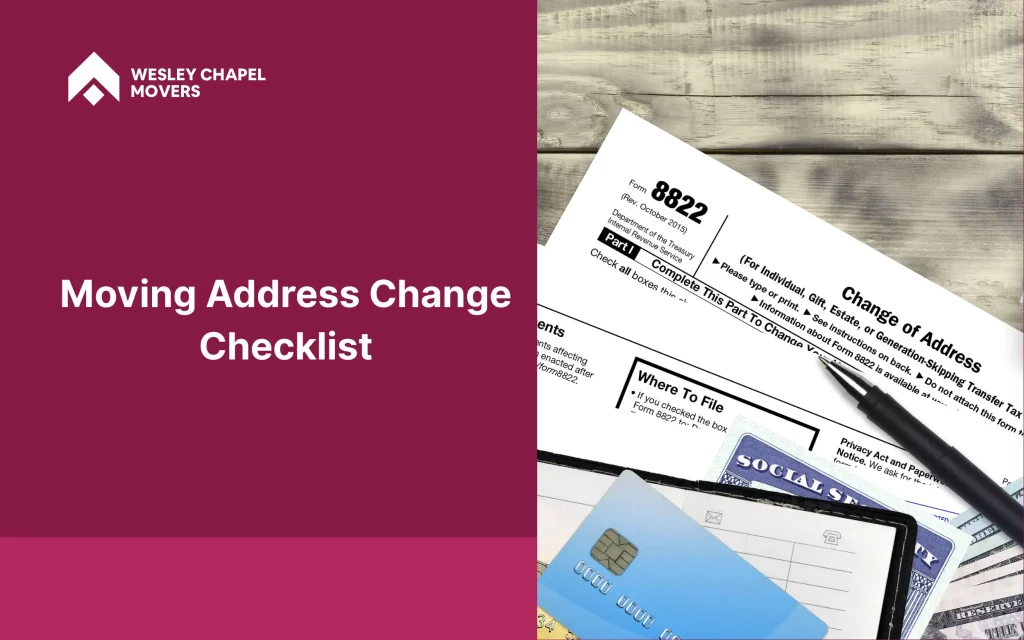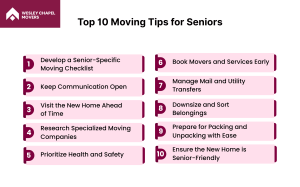A moving address change checklist includes notifying the U.S. Postal Service, updating government agencies such as the DMV and IRS, informing financial institutions like banks and credit card companies, and updating utilities, including electricity, water, and internet. It serves as a reliable system that keeps every service, account, and correspondence aligned with your new address and ensures nothing important is overlooked during the transition.
Planning ahead, ideally starting eight weeks before your move, helps you stay organized and in control of the many details that can otherwise lead to missed mail or service delays. The moving address change checklist follows a clear, time-based structure that divides the process into manageable stages. Each phase focuses on specific priorities such as researching your new area, notifying landlords or employers, updating identification records, and confirming utility transfers. By working through these steps in sequence, you minimize last-minute stress and maintain accuracy across all updates during and after the move.
8 Weeks Before Moving
The first eight weeks before your move set the foundation for everything that follows. This is the stage where major decisions are made and key preparations begin. Starting early gives you enough time to research, organize, and plan each step without pressure. Use this period to understand your new area, manage property details, gather documents, and create an action plan that keeps all tasks on schedule.
Research and Plan
Begin by researching your new area to understand the services and amenities available. Look into schools, healthcare providers, grocery stores, transportation options, and local facilities. Use online tools such as maps, city websites, and community forums to collect accurate information. Keep notes on nearby services you may need right after moving, and start contacting essential providers early. Knowing wha is available in your new neighborhood will make settling in much easier.
Property and Lease Management
If you are renting, notify your landlord or property manager as soon as possible, ideally 60 days before moving. Review your lease agreement for move-out requirements, security deposit terms, and notice periods. Set a date for your final inspection and confirm responsibilities for cleaning or repairs. Always request written confirmation of your notice to avoid misunderstandings during or after the move.
Document Organization
Start gathering all important documents in one place to prevent last-minute confusion. This includes identification, insurance policies, tax returns, medical records, and moving contracts. Store them in a labeled folder or digital backup for easy access when needed. Review each document for expiration dates and make necessary updates before moving day.
Key documents to gather include:
- Personal Identification: Driver’s license, passport, social security card, birth certificate.
- Financial Records: Bank statements, credit card information, loan documents, investment papers.
- Insurance Policies: Home, health, auto, and life insurance documents with updated contact details.
- Tax Documents: Recent tax returns, W-2 or 1099 forms, and related receipts.
- Medical Records: Health history, prescriptions, vaccination records, and contact information for healthcare providers.
- Property and Lease Papers: Lease agreement, mortgage documents, and landlord contact details.
- Employment Documents: Offer letters, pay stubs, HR correspondence, or relocation agreements.
- Moving-Related Contracts: Agreements with movers, packing receipts, or storage unit leases.
- Educational Records: School transcripts, enrollment papers, and transfer forms (if applicable).
Create Your Action Plan
Develop a checklist of everyone and every organization that needs your new address. This includes employers, banks, credit card companies, friends, family, utility providers, and subscription services. Prioritize which updates to handle first and mark off each task as you complete it. A clear action plan keeps you organized and reduces the chance of forgetting important notifications.
Key tasks:
- Make a list of all people and institutions to notify.
- Divide the list into categories such as work, banking, and services.
- Check off each update once completed.
6 Weeks Before Moving
Six weeks before your move is when administrative and financial preparations take center stage. This period ensures that all employment records, insurance details, government documentation, and memberships are properly updated. Handling these updates early prevents service interruptions, maintains benefit continuity, and avoids compliance issues that could arise after relocation. By the end of this phase, every essential institution connected to your professional, legal, and personal life should have your new address on file.
Employment Updates
Notify your employer and HR department as soon as your moving plans are finalized, especially if your relocation affects your job location or tax jurisdiction. Provide your new address, discuss potential relocation allowances, and request any updated tax or payroll forms. Confirm whether your benefits, such as healthcare or retirement plans, require address adjustments. Always ask for written confirmation once updates are processed to ensure your records are accurate.
Insurance Updates
Contact all insurance providers, including health, auto, home, and life, to update your address and verify that your coverage remains active throughout the move. If you are relocating to a new state, check for policy adjustments or coverage variations. After this, confirm your new address in writing and keep a record of each update for future reference.
Government Agency Notifications
Update your information with relevant government agencies to ensure compliance and prevent communication delays. Begin with the IRS for tax records, your local voter registration office, and the Social Security Administration if applicable. Check with your local city or county offices for additional requirements, especially for vehicle registration or property records.
Subscriptions and Memberships
Change your address for all subscriptions and memberships to prevent lost deliveries or billing issues. This includes streaming platforms, gym memberships, professional organizations, and magazine or meal kit subscriptions. Here is a list of things you can follow to track your progress and confirm that updates are completed before your move date.
- Update your address for all active subscriptions and memberships.
- Confirm delivery addresses for online services like Amazon or Netflix.
- Contact gyms or clubs to update records or transfer memberships.
- Review your list to ensure no service is missed.
4 Weeks Before Moving
With four weeks left before your move, it is time to handle the financial, logistical, and service-related updates that will make your transition seamless. This stage focuses on confirming all essential address changes, setting up mail forwarding, contacting your utility providers, and updating accounts with banks and other financial institutions. Taking care of these updates early helps prevent interruptions to mail delivery, payments, and services once you arrive at your new home.
Mail Forwarding Setup
Submit your USPS Change of Address form to ensure all mail reaches your new address without delay. You can complete this online through the USPS website or by visiting your local post office. Verify your start date for mail forwarding and keep your confirmation number in a safe place. Monitoring your mail delivery for the first few weeks after moving helps confirm that everything is being redirected correctly.
Here is the step-by-step online process for completing a USPS Change of Address:
- Visit the USPS page for forwarding and address changes, then select Change of Address.
- Select Permanent or Temporary and indicate whether the request is for an Individual, Family, or Business.
- Provide your old address, new address, and the date you want forwarding to start.
- Enter your email and phone so USPS can send your confirmation and updates. You will receive a confirmation letter or email with a code.
- Authorize the small $1.05 credit or debit card charge used for identity verification. The billing address should match your old or new address.
- Confirm all details and submit the request. Save your Confirmation Code from the finish screen or email.
Financial Institution Updates
Update your address with all banks, credit card companies, lenders, and investment accounts to prevent missed statements or payment issues. Contact each institution directly, whether online or by phone, and verify that all linked accounts and billing addresses reflect your new location. Updating these details in advance helps maintain uninterrupted financial communication.
Utility Services
Contact your utility providers about four weeks before moving to schedule service transfers or disconnections. Notify your providers for electricity, gas, water, internet, cable, and phone to ensure that your new home is ready on your move-in date. Ask for written confirmation of setup dates and settle any pending final bills at your current address.
Key tasks include:
- Schedule service disconnection and reconnection dates.
- Update your address for electricity, gas, water, and internet providers.
- Pay final bills and confirm zero balance.
- Save confirmation emails or receipts for reference.
Vehicle and Transportation
Update your vehicle registration, driver’s license, and car insurance information to comply with local regulations. Visit your DMV website to submit your new address and request updated documentation. Notify your auto insurance provider to ensure your policy remains valid in your new location.
Key tasks to do:
- Update your address with the DMV and car insurance company.
- Confirm policy coverage in your new area.
- Keep copies of all updated registration documents.
- Check renewal dates and license requirements for your new state.
Online Shopping and Retail
Notify online retailers such as Amazon, eBay, and Walmart of your new address to prevent misdelivered orders. Update saved shipping and billing addresses for your active shopping accounts and subscriptions. Check ongoing orders and deliveries to make sure they are routed to your new location.
Professional Services
Inform your tax preparer, accountant, or legal advisor of your new address to keep financial and legal records accurate. This ensures that important tax documents and correspondence reach you on time. Confirm that all forms reflect your updated information and prepare for upcoming tax filings with your new address.
2 Weeks Before Moving
Two weeks before your move is the time to finalize all remaining details, including confirming essential services, updating schools, verifying address changes, and preparing healthcare arrangements. Completing these tasks in advance prevents last-minute issues and ensures a smooth, stress-free transition for you and your family. By the end of this phase, every important update, including academic, utility, and medical, should be completed and confirmed.
Education and Family
Notify your children’s schools about your move at least two weeks in advance. This allows time for record transfers, enrollment updates, and communication between your current and new school districts. Provide the school with your new address, moving date, and contact information. Request copies of school records or have them sent directly to the new school. Confirm with the administration that all necessary forms are complete and your child’s enrollment is secure.
Verification and Confirmation
Double-check that your address updates are complete with all major institutions. Verify changes with the USPS, banks, and utility companies, ensuring that all records reflect your new address. Contact each organization by phone or email to confirm receipt and processing. Keep written proof or confirmation numbers from these updates for your records.
Essential Services Check
Make sure your critical home services, such as electricity, gas, water, and internet, are scheduled and ready at your new address. Contact providers to verify activation or transfer dates, ensuring that utilities will be live on move-in day. Note account numbers and installation appointments, and keep confirmation records handy for quick reference once you arrive.
Healthcare Preparations
Coordinate all healthcare-related updates before your move. Contact your current pharmacy to transfer prescriptions to a location near your new address. Notify your doctor’s office about the move and request refills or medical records if needed. Keep a list of your medications, allergies, and emergency contacts to share with your new healthcare providers after settling in.
1 Week Before Moving
One week before your move is your final window to confirm critical details. Use this period to verify USPS mail forwarding, make last-minute confirmation calls with utility companies and service providers, finalize pet care updates, and notify any additional services you rely on. Completing these final checks helps prevent last-minute surprises and keeps your move-in day organized and stress-free.
Final Mail Setup
Verify your USPS mail forwarding start date so important letters and packages reach your new address as soon as you arrive. Check the confirmation email or visit the USPS portal to confirm dates and make any needed edits. Keep your USPS confirmation number in a secure place and monitor delivery during the first weeks in your new home.
Last-Minute Confirmations
Call your electricity, water, gas, internet, cable, and moving company to confirm activation and arrival times. Ask for service start or end dates, technician windows, and any final balances. Keep a simple call log with names, times, and reference numbers in case issues arise.
Key tasks to do during this time frame:
- Confirm activation dates for electricity, water, gas, and internet.
- Verify moving crew arrival time and access instructions.
- Note account numbers and reference IDs in a call log.
- Clear final bills and keep receipts.
Pet Care Updates
Update your pet records with your current veterinarian and arrange transfers to a clinic near your new address. Request copies of vaccination records, prescriptions, and microchip numbers. Prepare a small pet go bag with food, medications, and comfort items for moving day.
Additional Services
Notify any cleaning service, pest control, lawn care, security monitoring, or delivery memberships about your move. Arrange final appointments for the current home and schedule start dates at the new address. Keep provider contact details and confirmations handy for moving day.
Key tasks:
- Cancel or transfer cleaning, pest control, and lawn services.
- Update security monitoring and key codes if applicable.
- Confirm appointment dates and access instructions.
- Save confirmations and provider contacts for quick reference.
Moving Day
Moving day is the most important phase of your relocation. This is the moment when preparation meets action, and completing the right tasks ensures both homes are left in perfect order. Your focus during this time period should be on performing a final walkthrough, leaving forwarding information, and recording utility readings. These last checks help you close all loose ends, protect your finances, and create a smooth handover for the next occupants.
Property Inspection
The final walkthrough ensures the home is left clean, organized, and free of forgotten items. Go room by room, checking closets, drawers, and cabinets. Confirm that appliances are unplugged, windows are closed, and utilities are turned off. Taking photos of each area is a smart way to document the property’s condition, especially for rentals or sales.
Information for New Occupants
Leave clear forwarding details and contact information for the new occupants in a visible spot, such as the kitchen counter or near the entryway. Include your forwarding address, utility provider contacts, and account details so they can easily reach service companies or your landlord if needed. This thoughtful step helps avoid confusion and ensures mail and inquiries reach you without delay.
Utility Documentation
Take meter readings for electricity, gas, and water to verify usage up to your moving date. Record each reading clearly and take photos as evidence. Submit the readings to your utility providers immediately after recording them, and request written confirmation. Keeping copies protects you from future disputes or incorrect final bills.
First Week After Moving
The first week after moving is all about getting officially settled into your new location. This period focuses on updating identification records, confirming vehicle and insurance details, registering with local civic authorities, and setting up essential community services. Completing these updates early ensures your information is accurate across all systems and that your everyday activities continue without disruption.
Government ID Updates
Update your driver’s license and state ID within the first week of moving. Most states require address changes on identification within 10 to 30 days of relocation. Visit your local DMV office or website to complete the update online or in person. You will need proof of residency such as a lease, mortgage statement, or utility bill, along with your existing ID. Double-check that your new address appears correctly on the updated card before leaving or submitting your online application.
Vehicle and Insurance
Update your vehicle registration and auto insurance to reflect your new address. Contact your insurance provider to notify them of your move and verify whether your coverage or rates change based on the new location. Then visit or contact your DMV to update your registration and vehicle title. Keep copies of all updated records to avoid delays in renewal or coverage claims.
Civic Registration
Change your voter registration as soon as possible to ensure you are eligible to vote in your new district. You can complete this through your state’s election website, the DMV, or by submitting a paper registration form to your local election office. Provide proof of residence, such as a driver’s license with your new address or a utility bill. Once submitted, verify that your registration has been updated in the voter database.
Local Services Setup
Establish or update your local services and memberships to help you integrate into your community. Start by updating your library card with your new address and checking in with your local government or homeowners association for details on services like trash collection, recycling schedules, and neighborhood events. Joining community organizations or clubs can also help you build connections in your new area.
Healthcare Continuation
Transfer your prescriptions and medical information to healthcare providers in your new area. Contact your current pharmacy to arrange a prescription transfer and provide the details of your new pharmacy. Notify your primary care doctor about your move and request that medical records be sent to your new provider. Set up a consultation with your new doctor or healthcare center to maintain continuity of care.
First Month After Moving (Ongoing)
During this period, it is all about adjustment and organization. While the initial relocation tasks are complete, several ongoing updates are still needed to align your personal, professional, and legal information with your new address. This stage focuses on updating personal and professional contacts, revising digital and financial records, finalizing legal documents, and integrating into your new community.
Personal Network Updates
Update your friends, family, and neighbors with your new address and contact information to maintain smooth communication. Send a quick message, email, or change-of-address card to let everyone know how to reach you. Update your details on social media or messaging platforms so people can find you easily. Keeping these connections active helps you stay engaged and supported after the move.
Digital Account Management
Review and update your digital and online accounts to prevent disruptions in billing, shipping, or communication. Update your address on banking apps, subscription platforms, and online retailers such as Amazon and Netflix. Log in to your social media and email accounts to verify that your recovery details and phone numbers are current. Setting reminders to check your subscriptions or auto-renewal dates helps you stay organized.
Professional Updates
Notify your employer, clients, colleagues, and professional organizations about your new address. This ensures you continue receiving official correspondence, project materials, and tax documents. Contact your HR department to update your address for payroll and benefits. If you are a member of a professional board or union, submit your new contact details through their online portal or email.
Community Integration
Take time to connect with your new community and establish a sense of belonging. Update your library card with your new address and sign up for local services such as trash collection, gyms, or recreational programs. Joining local clubs or organizations helps you meet neighbors and become familiar with community routines. Participation in local events makes your new area feel more like home.
Legal and Financial Documents
Update all legal and financial documents to ensure your address is accurate and recognized across institutions. This includes wills, estate documents, passports, and any court-related filings. Review your bank or investment accounts for address accuracy and confirm that statements and notices are delivered correctly. For legal documents like wills, consult a professional to update records safely and in compliance with local regulations.
Safety and Emergency
Review and update your emergency contact information so family members, healthcare providers, and local emergency services can reach you quickly if needed. Ensure your medical providers and workplace have your current address and phone number. Update family and close friends with your new details and verify that emergency lists in your phone, workplace, or medical records are current.
Partner With Moving Professionals Who Understand the Details
Moving marks the start of an exciting new chapter, but it can also bring challenges and stress. Partnering with experienced moving professionals transforms the process into a smooth, organized, and well-managed experience. A dependable moving company handles logistics, heavy lifting, and detailed coordination, keeping your relocation efficient and worry-free. Experts who understand timelines, packing methods, and transportation requirements ensure that your belongings are secure and your schedule stays on track.
Professional movers offer tailored services such as packing, storage, and insurance coverage to fit your specific needs. They treat fragile and valuable items with care and manage delivery efficiently, allowing you to focus on settling into your new home.
When selecting a moving company, check credentials, compare quotes, and confirm that they are licensed and insured. Choose movers with transparent pricing, strong customer reviews, and proven experience. Working with the right professionals guarantees a safe, efficient, and confident start to your new journey.






